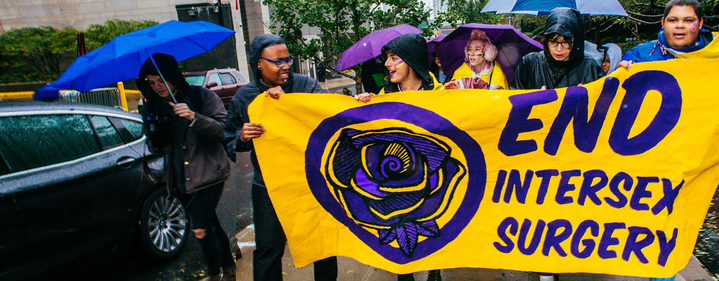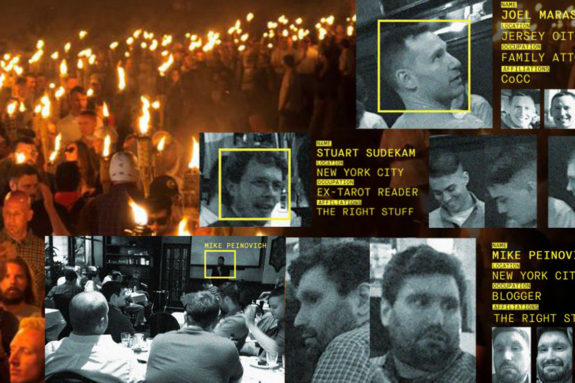It will take more than a new category on our passports.
Those born intersex are rendered unspeakable by the treatment we receive from our society.
I do not just mean the daily grind of interphobia: abuse on the street, ignorance as ingrained as it is pervasive, the endless frustrations and indignities of bureaucracy. I also mean “treatment” in the medical sense. The suffering caused to intersex people has been thoroughly routinized and professionalized, with much of the harm done to those of us with intersex variations carried out through established medical practices, in clinical settings, at the hands of those with medical degrees. What could be accepted as a quirk of life is instead cast as a “disorder” to be corrected at all costs.
We survive through attempts to solve us. That we exist at all is a fact buried, which means our theorizing has to begin by unearthing social conditions carefully concealed from us, providing a new account which makes the scar tissue legible.
The normalization of the abuses and indignities we suffer seems intractable. And we have found little support from the existing left. Attempting to understand intersex experiences can often be isolating. While I usually grapple with my social conditions using theory, I’ve found myself unable to rely on existing revolutionary thinking. Most Marxist writing on gender has been poor in quality, and often misses the point. While Marx’s own writings were rich with rhetorical sensuousness, today the writers who claim his legacy are prone to speaking in generalities picked clean of trauma, scooped empty of viscera as if by a taxidermist.
Traditions which are weaker and vaguer in explanations, such as radical feminism, deconstruction, and psychoanalysis, have often won out at both an individual and institutional level by, at the very least, presenting an account of the humdrum, brutal realities of gendered experience. But the result is that the ways sexual violence binds itself intimately with class society remains a problem none can address. Nowhere is this failing clearer than the predominant silence of Marxist gender theory concerning intersex variations. While happy to reduce gender to baby bearing, it stutters over messier matters. The worst treatment of intersex people is violence performed routinely by those positioned in the ruling class. And yet these are practices that Marxism, and other supposedly revolutionary schools, have failed to do much to end or even bring into view (nor, needless to say, to abolish). Those who are difficult to sort clearly into one half or another of the workforce seem instead to induce an awkward silence.
_____
Let’s begin with an account from an anonymous intersex person describing the disastrous impact on their well-being of hormone replacement therapy performed without fully informed consent:
After two years of changing my dosage, I began to feel like another person altogether and wasn’t a person I liked. I eventually was told that the testosterone patches didn’t need to go on my testes but could go on my arm. Even with that knowledge and change in treatment I still felt miserable. When I was seventeen, out of desperation to save my personality I decided to go cold turkey on everything. I stopped my hormones and my medications for being bipolar. I thought at the time I would encounter more resistance from my family, but once I stood up for myself they left me alone. After a week of being off hormones and medications, I actually started to feel better. I was still a confused teenager. And I still had regular teenager issues, like not having self-confidence about the way I looked. But all the emotional turbulence and identity confusion was gone. I felt like my brain had been given back to me. In school, I went from having been behind two years to graduate on time, as a runner-up to the valedictorian.
The author describes their life navigating the medical establishment for years before they finally found queer camaraderie among the countercultural spaces of the Radical Faeries. Doctors and nurses treated a low-testosterone puberty as a dire fate, and certainly did not offer estrogen treatment as an alternative.
This narrative is typical for those with XXY chromosomes. Developmentally, as an intersex variation, XXY genetics tends to cause a striking appearance: fat distribution emphasizes the hips, facial features are softer than expected of men, muscle tone is unusually low. Contrary to popular associations of testosterone with manly essence, an XXY puberty tends to result in above-average height, generally over six feet, and exceptionally long limbs. Beyond anatomy, dyspraxia is also common. While in some cases being born XXY results in cryptorchidism (undescended testicles), infants born with this variation are for the most part assigned male. As such, XXY is frequently identified only during adolescence (or later during adulthood, often when trying to conceive a child). At this stage, it is viewed primarily as a matter to be “corrected” through the introduction of exogenous androgens like testosterone. Equivalent treatment is given to intersex people assigned female: large doses of estrogen are used either to overpower internal testicles or compensate for earlier surgical removal. The worst treatment of intersex infants and children is meted out to those born with ambiguously sexed genitals. Under the pretexts of “fixing plumbing” and preventing future cancer, such surgeries are in reality cosmetic exercises performed altogether prematurely. In many cases procedures are unsuccessful on their own terms, and “corrections” must continue through childhood and adolescence, with decreasing returns and increasing imprecision as scar tissue accumulates.
The basis for approving these surgeries is nakedly heterosexist: a vagina is presumed to need width adequate to an assumed husband or boyfriend, a penis is expected to be suitable for penetration, clitoral tissue is excised when considered excessive. In most cases, Intersex Genital Mutilation (IGM) is not mandated actively by national governments. What is more common is the expectation that births be registered with the relevant authorities, and that the “sex” (either male or female) be declared. In this context, having an intersex child raised openly as such amounts to administrative illegibility.
The meticulous legal scholarship of queer Marxist thinker Grietje Baarshas explored how even the introduction of a third “X” sex marker (as seen recently in Germany) can result in simply providing another bureaucratic tool for parents to be coerced towards approving IGM surgeries. Without a widely recognized social category to accompany the upbringing of intersex-variant children, it seems unlikely that any policy fix will be possible. To truly be an objective breakthrough in the emancipation of intersex people, any new administrative category for gender must match a more profound history of recognition.
However, IGM is not limited to those who experience ambiguous birth assignment. Last year I interviewed a nonbinary intersex activist named Martin Hasani who was born with a variation usually seen as relatively minor: a hypospadias. The urethral opening in these cases appears somewhere along the underside of the shaft. Doctors justify “corrections” on the basis that the (presumed) boy would otherwise have to sit to urinate. In Martin’s case this meant eleven operations between the ages of three and seventeen. Later surgeries appeared to be purely cosmetic in character, but it was unclear why they were happening at all. Martin told me they felt the surgeries were at the root of their subsequent gender dysphoria. They felt reduced to a human guinea pig. The doctor performing these operations was eventually fired, primarily as a consequence of sexual molestation that had accompanied his practice. But in the majority of cases, doctors face no consequences either professionally or legally. Several localities specifically exempt removal of tissue from intersex people that would otherwise be explicitly outlawed by anti–Female Genital Mutilation legislation.
Ending these surgeries is the primary political aim of the intersex movement, which terms the surgeries “Intersex Genital Mutilation.” Both children and parents alike are lied to by medical professionals as a matter of standard practice. Sex hormone pills are described as vitamins, unnecessary vaginoplasty is described as “bladder surgery,” gonads are passed off as “tumors.” This euphemistic betrayal of informed consent is perpetuated by parents sometimes unwittingly and sometimes actively, the result of an ideology that sees intersex variation as an unfortunate deviation from the norm.
An irony apparent to many is that the hormonal and surgical treatments capriciously performed on intersex-variant people would require, for most trans people, the adamant and unflagging navigation of gatekeeping institutions. Whereas a teenage trans boy accessing testosterone treatment is a scandal, the drug is administered to intersex people routinely and often without basic consent, despite the well-known fertility risks.
_____
This litany of horrors and routinized mistreatment is often as familiar to intersex activists as it is shocking to those who’ve never encountered the topic before. Now for action. Let’s skip self-reflections on privilege and focus on liberating intersex people from our ongoing traditions: the intergenerational procession of mutilation and other forms of forcible concealment that have coerced us into silence, out of view, leaving us buried.
The time for mute horror is over. Holding these offences aloft as a conceptual indictment of gendered systems is easy enough. Ending the practices themselves is a greater challenge, and a far more important one. There is simply no excuse for any communist who lives in a city to not directly involve themselves in ending this practice: at least one local hospital is likely to perform cosmetically gender coercive surgeries on intersex infants and children. Find intersex activists, listen, and then do more than just listen: join campaigns, offer support, refuse to let us remain unspeakable.
And beyond that: remember that the intersex movement is in a blossoming form, and that mass awareness of intersex variations has yet to be achieved. Until education is systematized, many thousands will live as unwittingly intersex. For now, assume many more people live with intersex variations than can yet name their social conditions in those terms. It’s in the nature of both medicalization and the heterosexual regime to isolate us, and to reduce our perception of ourselves to freakish aberrants. The framework of an alliance between an oppressed group and its allies falls short: it’s common enough for those who will eventually out themselves as intersex to spend months or years at the outskirts of our movement, piecing together their experiences anew with awkward encounters and furtive web searches. Intersex liberation will be the work of a new consciousness, resistant to the medical establishment’s purposeful siloing of us, or it will be nothing at all.





